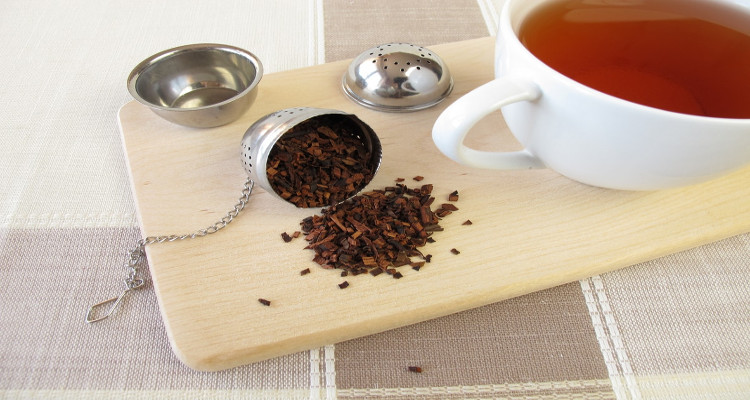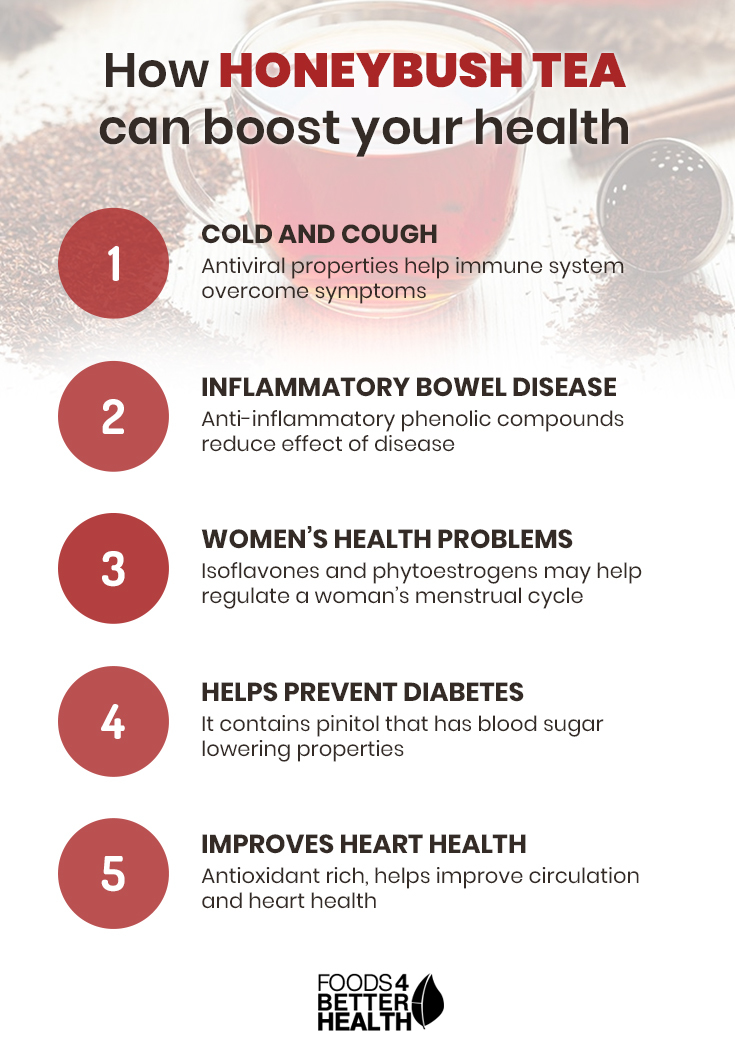
Honeybush tea is made from both the fermented and non-fermented stems and leaves of the Cyclopia intermedia plant. This herbal tea is native to South Africa, and it belongs to the legume family, Fabaceae.
Honeybush tea is an excellent source of polyphenols, flavonoids, phenolics, and other antioxidants. As a result, it’s possible that honeybush tea benefits those with diabetes, menopause, and cancer. It may also prevent colds, skin damage, and inflammatory bowel disease.
Is honeybush tea caffeine free? Yes, another benefit of honeybush tea is that it doesn’t contain caffeine, and it is low in tannins. This means it doesn’t affect the nervous system like coffee or regular tea.
In this article, we will explore everything about honeybush tea, including its nutrition facts, health benefits, taste, and side effects. We will also show you how to use honeybush tea, and throw in a honeybush tea recipe for you as well.
Honeybush Tea: Nutrition Facts
Regular consumption of honeybush tea has various short-term and long-term health benefits, and this is due to the many nutrients contained within the tea. What are the nutritional facts about honeybush tea?
Honeybush tea is loaded with nutrition. In one cup of honeybush tea, you will find adequate amounts of iron, potassium, sodium, calcium, copper, zinc, magnesium, and manganese.
This tea is also an excellent source of antioxidants such as pinitol, isoflavones, coumestans, xanthones, flavones, flavonoids, phenolics, polyphenols, xanthones, luteolin, and 4-hydroxycinnamic acid, among others.
Major phenolic compounds found in honeybush tea include isosakuranetin, mangiferin and O-glycosides of hesperitin, and a xanthone c-glycoside. Consequently, among honeybush tea’s properties are antifungal, anti-inflammatory, antioxidant, antidepressant, antiviral, and antimicrobial activities.
What Are the Benefits of Drinking Honeybush Tea?
Like most teas, honeybush tea is loaded with health benefits. For instance, you can use honeybush tea for weight loss since it lowers fat content in the bloodstream and increases metabolism.
You can also use honeybush tea for sleep because it doesn’t contain caffeine and promotes a sense of calmness in the body, while also treating nervousness and anxiety.
Honeybush tea is also beneficial for the immune system, inflammation, diabetes, cancer, menopause, skin damage, heart health, and bone health. As you read on, you will learn about the honeybush tea benefits in further detail.
1. Prevents Cold and Cough
Antibacterial and antiviral properties in honeybush tea protect the immune system against oxidative stress. Therefore, honeybush tea may help alleviate asthma, bronchitis, coughing, pulmonic tuberculosis, catarrh, flu, and the common cold.
Research shows that the pinitol in honeybush acts as an expectorant, and thus can help relieve coughing and benefit immune health.
2. Protects against Inflammatory Bowel Disease
The phenolic compounds in honeybush tea can reduce inflammation and prevent the development of inflammatory bowel diseases (IBD) like Crohn’s disease. Phenolic compounds have a suppressive effect on the body’s inflammatory response, which was shown in inflamed intestinal cells similar to those seen in IBD.
Due to its flavonoid content, honeybush tea could also relieve diarrhea, indigestion, and abdominal cramping.
3. Helps Treat Women’s Health Problems
Honeybush tea may be quite valuable for many women’s health problems, especially during menopause, including depression, mood swings, hot flashes, and osteoporosis. The isoflavones and coumestans in honeybush tea are phytoestrogens, and can help regulate a woman’s menstrual cycle. They are useful for menopausal symptoms as well.
4. Treats and Prevents Cancer
Honeybush tea is also effective in the treatment and prevention of cancer. A study published in the journal Nutrition and Cancer in 2010 found that honeybush tea inhibited tumor growth in rats. Research also shows that honeybush tea can protect against certain types of mutagenesis in the liver.
5. Improves Diabetes
The pinitol in honeybush is often studied for its blood sugar-lowering properties. It has been shown to exert insulin-like effects and improve glycemic control in mice. As a result, honeybush may be effective for those with diabetes.
6. Prevents Skin Damage and Wrinkles
Studies show that honeybush extract protects against sunburns and skin damage, especially due to ultraviolet B rays. Research published in the Journal of Photochemistry and Photobiology in 2011 found that honeybush protects the skin from inflammation and oxidative damage.
It also significantly reduces sunburn symptoms like peeling skin, hardened skin, edema, and reddened skin.
Moreover, a study published in the Journal of Cosmetic and Laser Therapy in 2018 found that honeybush extract is effective for improving skin wrinkles, hydration, and elasticity. For this reason, honeybush tea is thought to be helpful for protecting the skin against aging.
7. Promotes Weight Loss
Honeybush tea also promotes weight loss. Research published in the journal Phytomedicine in 2013 found that fermented and non-fermented honeybush tea can inhibit fat accumulation in animal and cellular obesity models.
In other words, this tea prevents the body from storing fat while also helping to break down the existing fat in the body. The researchers attributed the results to the polyphenols in honeybush tea, and therefore concluded that honeybush tea has anti-obesity potential.
8. Improves Heart Health
Can you use honeybush tea for blood pressure issues, high cholesterol, and heart health in general? Honeybush tea may improve heart health and circulation due to its antioxidant content.
Consuming Honeybush Tea: Taste, How to Use
Honeybush tea is distinguished by its mildly sweet and refreshing fruity taste. The addition of honey to the tea will bring out the honey-like flavor of the honeybush herb.
Honeybush tea can be consumed multiple times daily. For infusion of honeybush tea, you can steep two teaspoons of honeybush tea for a cupful, or two tablespoons for a pot full, of tea in hot water.
It will take 10 to 15 minutes for a pot and about five minutes for a cup, to bring out the nutrition and flavor of the honeybush tea. Some prefer to steep the tea longer. The antioxidant content and flavor will grow the longer you steep honeybush tea.
Honeybush tea can also be infused and made into iced tea. You can mix this tea with fruit juice. Throughout the day, it is a good idea to rotate consumption of honeybush tea and a similar tea known as rooibos tea.
Are There Any Side Effects of Drinking Honeybush Tea?
Although there are important benefits, it is also important to consider any potential honeybush tea side effects. That being said, no ill-effects have been reported. It is also safe to enjoy honeybush tea when pregnant.
However, before taking any herbal tea like honeybush tea, it is a good idea to consult your doctor. You will want to make sure that your herbal treatment does not interfere with any of your medications or medical condition.
It is also best to avoid excessive consumption of honeybush tea just to be safe.
Honeybush Tea Recipe: How to Make
Honeybush tea can be found online and in health food stores, regular grocery stores, and even herbal teashops. You can purchase honeybush tea bags or loose honeybush tea leaves. You will then transform them into a hot or cold beverage.
How do you make honeybush tea?
Directions:
- Use one teaspoon of dried honeybush tea leaves in an 8-oz. teacup.
- Heat the water to 212 degrees Fahrenheit. Bring the water to a boil and let it steep for a minute. Then, slightly reduce the temperature.
- Pour the hot water over the tea leaves, and let it steep for five to seven minutes. Strain the leaves from the cup before consumption.
For iced honeybush tea, you will follow the same directions; however, you will pour the tea into a tall glass tumbler and then add ice. You will also want to cool the tea in the refrigerator and enjoy it later. Again, honey will help enhance the flavor of the honeybush tea.
Final Thoughts on Honeybush Tea
Honeybush tea is loaded with nutrition and health benefits. It is an excellent source of flavonoids, polyphenols, phenolics, and other antioxidants.
As a result, honeybush tea benefits include preventing colds and coughs, protecting against digestive issues and cancer, improving diabetes and heart health, promoting women’s health and weight loss, and preventing skin damage.
This sweet and delicious tea is also caffeine free and low in tannins, so it doesn’t affect the nervous system like regular tea or coffee. Honeybush tea is considered safe; however, be sure to consult your health practitioner or herbalist before using any herbal remedy.
Sources:
Im, A., et al., “Anti-wrinkle effects of fermented and non-fermented Cyclopia intermedia in hairless mice,” BMC Complementary & Alternative Medicine, Oct. 2014; 14: 424, doi: 10.1186/1472-6882-14-424.
Zagar, T., “Herbal Healer: What is honeybush?” NWI Times, October 3, 2012; https://www.nwitimes.com/niche/get-healthy/healthy-living/herbal-healer-what-is-honeybush/article_4d9f74b9-5834-588c-a9d8-46e8cc03edb1.html, last accessed June 26, 2018.
“5 Proven Health Benefits of Honeybush Tea,” Cure Joy, May 28, 2018; https://india.curejoy.com/content/health-benefits-of-honeybush-tea/, last accessed June 26, 2018.
Herbst, M., “Facts Sheet on Honeybush Tea,” Cancer Association of South Africa, March 4, 2015, doi: 10.13140/2.1.1824.0804.
“Honeybush Tea (Cyclopia Intermedia),” Rooibos; http://www.rooibos.ch/honeybush_info.html, last accessed June 26, 2018.
Espinoza, J., “7 Health Benefits of Rooibos (and Honeybush) Tea (plus some delicious recipes!),” Delicious Obsessions, September 12, 2013; https://www.deliciousobsessions.com/2013/09/7-health-benefits-rooibos-tea-plus-delicious-recipes/, last accessed June 26, 2018.
Bryan, D., “Health Benefits of Honeybush Tea,” Livestrong, October 3, 2017; https://www.livestrong.com/article/257007-health-benefits-of-honeybush-tea/, last accessed June 28, 2018.
Kamara, B., et al., “Polyphenols from Honeybush tea (Cyclopia intermedia),” Journal of Agriculture and Food Chemistry, June 18, 2003; 51(13): 3874-3879, doi: 10.1021/jf0210730.
Sissing, L., et al., “Modulating Effects of Rooibos and Honeybush Herbal Teas on the Development of Esophageal Papillomas in Rats,” Nutrition and Cancer, May 2, 2011, 63(4): 600-610, doi: 10.1080/01635581.2011.539313.
Choi, S., et al., “Protective effects of fermented honeybush (Cyclopia intermedia) extract (HU-018) against skin aging: a randomized, double-blinded, placebo-controlled study,” Journal of Cosmetic and Laser Therapy, Feb. 2018: 1-6, doi: 10.1080/14764172.2017.1418512.
Frey, M., “Honeybush Tea Benefits and Effects,” VeryWellFit; https://www.verywellfit.com/honeybush-tea-benefits-and-side-effects-4163882, last updated April 30, 2018.
Schoffro Cook, M., “Honeybush Tea Stops Fat Accumulation,” Care2, May 17, 2013; https://www.care2.com/greenliving/honeybush-tea-stops-fat-accumulation.html, last accessed June 28, 2018.
Petrova, A., et al., “Photoprotection by honeybush extracts, hesperidin and mangiferin against UVB-induced skin damage in SKH-1 mice,” Journal of Photochemical and Photobiology, May 2011; 103(2): 126-139, doi: 10.1016/j.jphotobiol.2011.02.020.
Bates, S., et al., “Insulin-like effect of pinitol,” British Journal of Pharmacology, Aug. 2000; 130(8): 1944-1948, doi: 10.1038/sj.bjp.0703523.
Kochrekar, M., “Is It Safe to Drink Honeybush and Booibos Tea in Pregnancy?” Mom Junction, January 24, 2018; http://www.momjunction.com/articles/rooibos-and-honeybush-tea-during-pregnancy_00386291/#gref, last accessed June 28, 2018.














